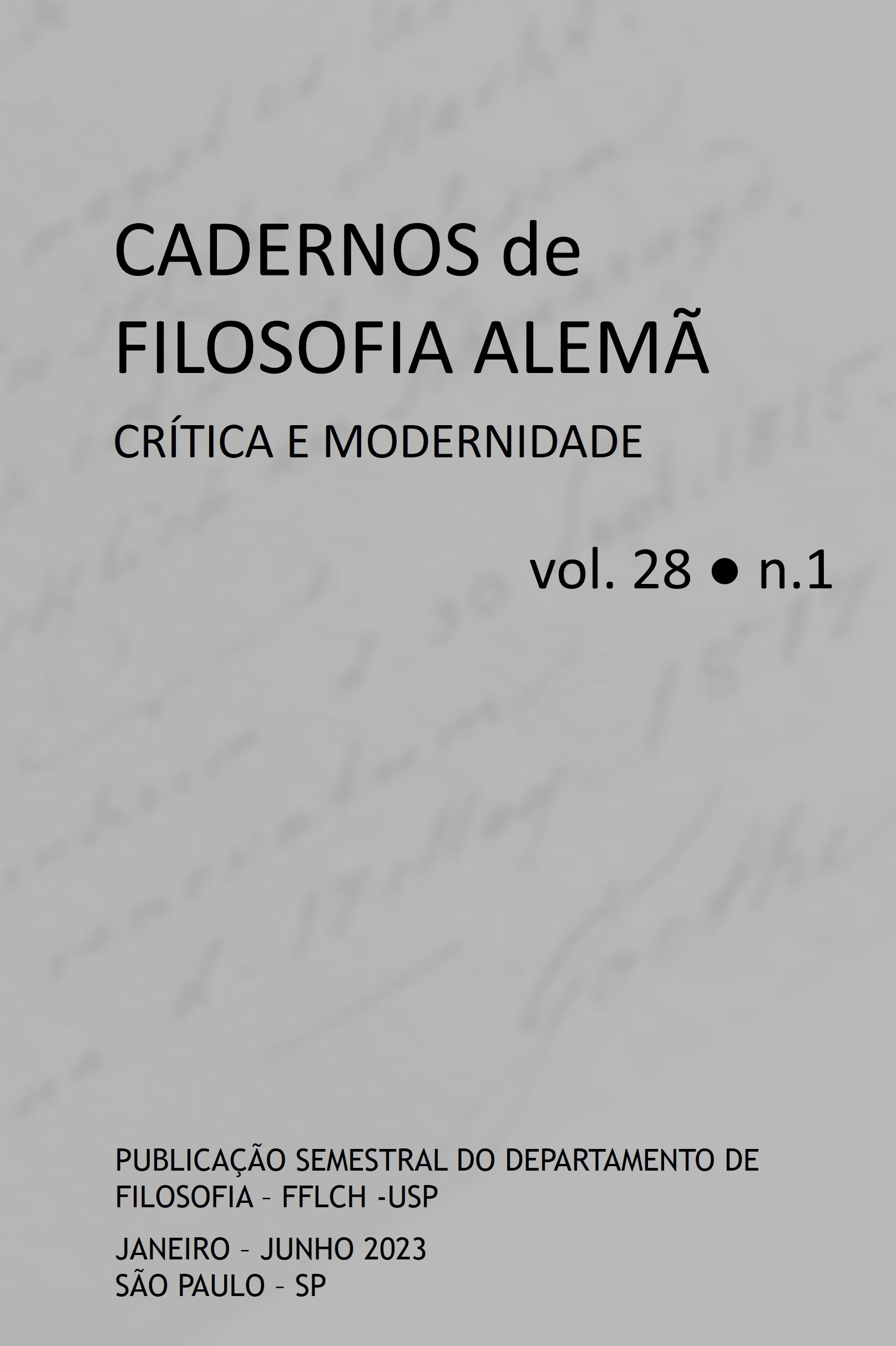Notes on montage and critical theory in Walter Benjamin
DOI:
https://doi.org/10.11606/issn.2318-9800.v28i1p13-24Keywords:
Walter Benjamin, Montage, Critical Theory, Charles BaudelaireAbstract
This article intends to outline some notes on the concept of montage in Walter Benjamin's writings and the relationship of this concept with Benjamin's critical theory. In methodological fragments linked to the project of a book about Charles Baudelaire, which only became public in the late 1960s, there is one of the rare records of the expression ‘critical theory’ (kritische Theorie). It is used by Benjamin to characterize his theoretical methodological self-understanding, in a direct link of this expression to framing and montage procedures associated with the photographic or filmic camera. Sustaining the link exposed in the methodological notes between critical theory – in the Benjaminian sense of this theoretical practice – and montage poses some questions. First, it is necessary to know what montage means for Benjamin. Particularly in the 1930s, the development of this notion is seen in various objects, in essays on cinema, Brecht's epic theater, Dada and Surrealist avant-gardes, Alfred Döblin's literature and materialist historiography. Furthermore, it is necessary to indicate in what sense the procedure arising from the arts and the new technical reproduction devices can contribute to the theory. Benjamin does not consider editing only from a procedural point of view, but emphasizes, for example, the pedagogical function and the cognitive gain provided through theatrical experiments. Likewise, Benjamin draws attention to the possibility of expansion of perception, provided by the cinematographic technique through the liberation of the optical unconscious.
Downloads
References
Benjamin, W.; Barrento, J. et al. (2015). Comentário. In: Benjamin, W. Baudelaire e a modernidade. Belo Horizonte: Autêntica.
Benjamin, W. (2006). Passagens. Belo Horizonte: Editora UFMG; São Paulo: Imprensa Oficial do Estado de São Paulo.
Benjamin, W. (2012a). A imagem de Proust. In: Obras escolhidas I: Magia e técnica, arte e política. São Paulo: Brasilense.
Benjamin, W. (2012b). A obra de arte na era de sua reprodutibilidade técnica. In: Obras escolhidas I: Magia e técnica, arte e política. São Paulo: Brasilense.
Benjamin, W. (2012c). O autor como produtor. In: Obras escolhidas I: Magia e técnica, arte e política. São Paulo: Brasilense.
Benjamin, W. (2012d). Pequena história da fotografia. In: Obras escolhidas I: Magia e técnica, arte e política. São Paulo: Brasilense.
Benjamin, W. (2012e). Que é o teatro épico? In: Obras escolhidas I: Magia e técnica, arte e política. São Paulo: Brasilense.
Benjamin, W. (2012f). Obras escolhidas II: Rua de mão única. São Paulo: Brasilense.
Benjamin, W. (2013). Instituto alemão de livre pesquisa. In: O capitalismo como religião. São Paulo: Boitempo.
Benjamin, W. (2015). Sobre alguns motivos na obra de Baudelaire. In: Baudelaire e a modernidade. Belo Horizonte: Autêntica.
Bolle, W. (1994). Fisiognomia da Metrópole Moderna: Representação da História em Walter Benjamin. São Paulo: EDUSP.
Fleck, A. (2017). Afinal de contas, o que é teoria crítica? Princípios: Revista de Filosofia, Natal, 24(44), 97-127.
Gagnebin, J. M. (1983). Walter Benjamin: os cacos da história. São Paulo: n-1, 2018. HORKHEIMER, Max. Teoria Tradicional e Teoria Crítica. In: Benjamin, W. et al. Os Pensadores. São Paulo: Abril Cultural.
Kang, J. (2009). O espetáculo da modernidade: A crítica da cultura de Walter Benjamin. Novos Estudos CEBRAP, 84, 214-233.
Machado, C. E. (2015). Walter Benjamin: “montagem literária”, crítica à ideia do progresso, história e tempo messiânico. In: Machado, C. E.; Machado, R. J.; Vedda, M. (orgs.). Walter Benjamin: experiência histórica e imagens dialéticas. São Paulo: UNESP, p. 413-420.
Nobre, M. (org.). (2013). Curso livre de Teoria Crítica. Campinas: Papirus.
Nobre, M. (2011). A teoria crítica. Rio de Janeiro: Zahar.
Palhares, T. (2013). Walter Benjamin: teoria da arte e reprodutibilidade técnica. In: Nobre, M. (org.). Curso livre de teoria crítica. Campinas: Papirus, p.21-33.
Piccone, P. (2005). General Introduction. In: Arato, A.; Gebhardt, E. The Essential Frankfurt School Reader. New York: Continuum, p. XI-XXIII.
Seligmann-Silva, M. (2011). A redescoberta do idealismo mágico. In: Benjamin, W. O conceito de crítica de arte no romantismo alemão. São Paulo: Iluminuras, p.9-14.
Souza, L. (2019). Walter Benjamin e a modernidade: a recusa da modernité de Baudelaire. In: Palhares, T. (ed.). Arte, estética e modernidade. Campinas, SP: UNICAMP/IFCH.
Tiedemann, R. (2006). Introdução à edição alemã (1982). In: Benjamin, W. Passagens. Belo Horizonte: Editora UFMG; São Paulo: Imprensa Oficial do Estado de São Paulo, p.13-33.
Wohlfarth, I. (1986). Et Cetera? The Historian as Chiffonier. Revista New German Critique, 39, Second Special Issue on Walter Benjamin, p.142-168.
Downloads
Published
Issue
Section
License
Copyright (c) 2023 Lucas Melo Souza

This work is licensed under a Creative Commons Attribution-NoDerivatives 4.0 International License.
Information and conceptions on the texts are complete responsibility of the authors.
All the articles submitted before July 5th 2018 and those published after July 2021 are licensed under a CC BY-NC-ND license – except those published between the aforementioned dates, which are under the CC BY-NC-SA license. The permission for the translation of the material published under the license CC BY-NC-ND by third parts can be obtained with the consent of the author.
Open access policies - Diadorim
Rules applied before July 5th 2018:
Presenting a submission to our Editorial Board implies granting priority of publication for “Cadernos de filosofia alemã”, as well as transferring the copyright of texts (once published), which will be reproduced only with the manifest authorization of the editors. Authors keep the right to reuse the texts published in future editions of their work, without paying any fees to "Cadernos”. We will not grant the permission to re-edit or translate the texts for third parts without agreement of the author.


